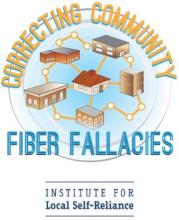New Report Dissects "Boondoggle Map"
Usually, we ignore the misinformation released by the Taxpayers Protection Alliance (TPA) but their latest efforts are so shady, we felt it was our responsibility to shine a light on its lack of validity and the organization's credibility. Our report, Correcting Community Fiber Fallacies: Taxpayers Protection Alliance Edition, takes a deeper look at the TAP's most recent attempt, which is filled with errors and a blatant disregard for the truth.
What Is A "Boondoggle" Anyway? This Map!
When we looked deeper, we discovered that TPA’s "Broadband Boondoggles: A Map of Failed Taxpayer-Funded Networks" is more misinformation than map.
All of the basic errors in the map display a lack of attention to detail; our short report examines the deceitful characteristics of this resource. Our purpose in publishing this report is to caution community leaders and citizens who are investigating publicly owned infrastructure; the TPA is not a credible source.

One of the more obvious errors: Sandy, Oregon, appears in Utah.
The map is also visually deceiving because it includes 213 communities, but only provides information for 87. Of the 213 on the map, the TPA only label 14 as "failures," which means less than 10 percent of the networks they document fit their own definition of "failure."
Clearly, TPA has proven that it seeks to spread any and all information it can find to discredit municipal networks, regardless of accuracy. Communities, public officials, or staff that research the option of publicly owned networks should review our report if they have ever considered the data in the Boondoggles Map.
Consider the Source
If your community is seeking better connectivity, thorough research will be the foundation of how you proceed. As part of your research, be sure to review the organizations that offer information.
From our report:




